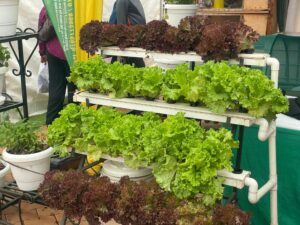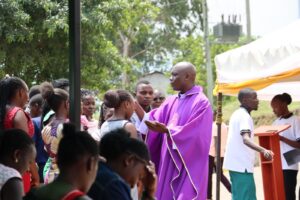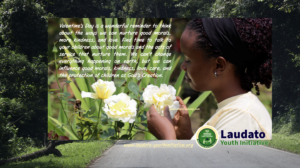By Laudato Voices | September 20, 2025.
As we come together to mark World Cleanup Day this September 20th, the urgency to rethink how we care for our environment has never been greater. This year’s theme: “Tackling Textile and Fashion Waste Through Circular Fashion” reminds us that waste is not just about what we throw away, but about the systems and habits we build around consumption. Globally, 92 million tonnes of textile waste are dumped or burned every year. That’s the equivalent of a truckload of clothes going to waste every second.
This problem feels far from home, but it’s not. Uganda, too, is facing a growing crisis of textile waste, combined with plastic pollution, poor sanitation, deforestation, and unsafe waste burning. Our landfills are overflowing, drainage systems are blocked, and smoke from garbage fires fills the air we breathe. In some places, especially urban slums and rural communities, children grow up playing in waste, not green gardens. This should worry us alot. Imagine which kind of air do they inhale? and does it leave them healthy?
But amidst these challenges, there is hope, and it is growing in the hands of young people.
At Laudato Youth Initiative, we’ve seen firsthand how creativity and commitment can turn trash into treasure. Youth from our Laudato Si Clubs are creatively thinking and regenerating textile and other hard pollutant wastes into baskets, curtains, flowers, and craft items that are both beautiful and sustainable. You may think this is a small impact no its not they are learning a value they they could use in future to change their world. It’s a local solution to a global crisis, and a reminder that with the right spirit, waste doesn’t have to end up in landfills or in flames.
This year’s World Cleanup Day theme has truly inspired us. It brings into focus the bigger picture of Uganda’s environmental crisis, not just textile waste, but also plastic pollution, deforestation, and poor public sanitation. It makes the case for collective, sustained action at the community level. And one of the most powerful models we can learn from is already happening just across our border in Rwanda.
In Rwanda, the last Saturday of every month is set aside for a national community cleanup and development day known as Umuganda. It’s more than just cleaning, it’s a civic duty. Everyone between 18 and 65 years old is expected to participate. Businesses close. Transport stops. And citizens, from top government officials to rural farmers, come out to work side by side, planting trees, sweeping roads, unblocking drainage channels, and building public infrastructure (Rwanda Governance Board, n.d.).
The results are visible and inspiring. Kigali is often ranked the cleanest city in Africa. More importantly, Umuganda has strengthened community bonds and created a deep sense of ownership over public spaces. According to the United Nations Development Programme (2023), it has also contributed to significant reductions in waste, improved public health, and fostered a culture of environmental responsibility.
Uganda is ripe for something similar.
Our country is blessed with abundant natural beauty and a young, vibrant population, but we are losing our forests at an alarming rate over 90,000 hectares annually, mainly to charcoal production and agricultural encroachment (Turyahikayo, 2022). Plastic waste continues to clog our lakes, rivers, and roads. According to NEMA (2025), more than half of all plastic in Uganda is never collected or recycled, leading to floods, disease outbreaks, and polluted farmland. And where waste collection is weak or non-existent, many families are forced to burn their rubbish, exposing communities to toxic air that causes respiratory diseases.
In such a context, a National Green Day, or a monthly, community-led cleanup day modeled after Umuganda, could be exactly the spark we need. It would not just be a day to clean up, but a movement to reconnect citizens to their environment, build stronger communities, and promote a shared culture of care.
During Sanitation Week 2025, the Ministry of Health signaled its support for such efforts by announcing plans to declare the last Saturday of every month as Uganda’s official National Cleanup Day, when all businesses would close and every citizen would be required to participate in cleaning their communities (Ministry of Health Uganda, 2025). This initiative, shared in a joint media briefing by Cate Namyalo, a Senior Environment Officer, aims to curb the spread of preventable diseases linked to poor sanitation. While the policy is still in the works, it’s a strong signal that Uganda is waking up to the power of community-led action.
At Laudato Youth Initiative, we believe youth must be at the heart of this initiative. Inspired by Laudato Si’, Pope Francis’ encyclical on care for our common home, the Catholic Social Teachings on the environment, SDG 13 we have built a nationwide network of Laudato Si Clubs in schools, parishes, and communities. We are leading cleanups, running environmental education sessions, planting trees, and now embarking on a bold campaign to plant one million trees across the country. But we can’t do it alone.
A Green Day program, backed by national policy, would give us the structure to mobilize even more young people, alongside parents, teachers, local leaders, and faith communities. With the right tools from gloves and bins to awareness campaigns and training this could be one of Uganda’s most transformative public initiatives. And it doesn’t have to start big. It just has to start.
The church has already taken important steps. At the 10th anniversary of Laudato Si, partners’ encounter, Kampala – Uganda, we were reminded of the deep wisdom embedded in Laudato Si’, Pope Francis’ powerful 2015 encyclical calling on all people of good will to embrace ecological conversion. Fr. Ambrose Bwangatto, grounding us in faith, purpose, and unity reminding us of our interconnectedness, inter-dependence and inter-relatedness with all of creation.
We reflected on the misinterpretation of dominion over the earth, as outlined in Genesis, and the urgent need to correct course by embracing care, justice, and responsibility for our common home. The encyclical’s message is not just theological it is profoundly practical, calling for action at all levels of society.
We are taking note of the urgent appeal that Uganda cannot continue to be defined by its dependence on ever increasing plastic use. The time for change is now, each one of us must champion sustainable practices, from saying no to disposable plastic bottles to holding our institutions accountable. And as a network, we have demonstrated today and we will continue to do so, that a plastic free Uganda is possible. We have resolved that in all our meetings and gatherings; we shall carry our own water dispensers and water bottles to limit on littering. This effort emphasized the need to eliminate single-use plastics from church events a powerful message all of us can adopt and encourage others to embrace. But the question remains how many parishes know about this call or have truly embraced this call?

This year’s World Cleanup Day Message United Against Plastic Pollution makes it clear: we need to act now, together. Not just one day a year, but as a regular habit. Let’s transform World Cleanup Day from a single calendar event into the launchpad for a national monthly movement. Let’s clean our communities not just for show, but for life for our health, for our climate, and for the future of this beautiful land the “Pearl of Africa.”
Uganda is standing at a crossroads. The time to act is now.
If you are a school, a parish, an NGO, a private business, or a government agency, we invite you to partner with us. Join us in dreaming, designing, and delivering Uganda’s very own Green Days. Let’s build something meaningful, not just for ourselves, but for generations to come. Reach out to us at 📧 laudatoyouthinitiative@gmail.com Let’s clean, care, and create a greener Uganda together. Happy World Clean Up day.
About World Cleanup Day
According to UN-Habitant, On 8 December 2023, the United Nations General Assembly adopted resolution 78/122, proclaiming 20 September as World Cleanup Day. The resolution invites Member States, UN agencies, international and regional organizations, civil society, the private sector, and academia to mark the day through clean-ups and awareness-raising activities. World Cleanup Day builds on years of grassroots initiatives that have mobilized millions, reminding us of the shared responsibility to protect our planet.
References
Ministry of Health Uganda. (2025, March 19). National Sanitation Week 2025 launched in Katanga to tackle poor hygiene and disease prevention. https://health.go.ug/sanitation-week-2025-launched-in-katanga-to-tackle-poor-hygiene-and-disease-prevention/
NEMA. (2025, June 24). NEMA cleans up Kabale Town ahead of World Environment Day. The Voice Uganda. https://www.thevoiceug.com/en/news/nema-cleans-up-kabale-town-ahead-of-world-environment-day/
Rwanda Governance Board. (n.d.). Umuganda: A tool for national development and community spirit. https://www.theoffice.rw/about-rwanda/umuganda/
Turyahikayo, R. (2022). Charcoal burning, deforestation, and Uganda’s climate future. Makerere University Environmental Review, 14(3), 112-119.
United Nations Development Programme. (2023, November 15). Umuganda: Rwanda’s audacity of hope to end plastic pollution. https://www.undp.org/blog/umuganda-rwandas-audacity-hope-end-plastic-pollution
World Cleanup Day. (2025). World Cleanup Day 2025: Tackling Textile and Fashion Waste Through Circular Fashion. https://www.worldcleanupday.org














